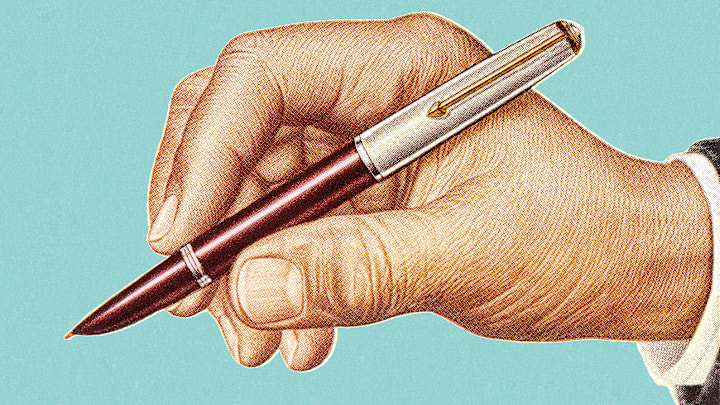In our age of bloggers, spammers, texters, and tweeters, there are types of writing earlier eras couldn’t have imagined. But there are also many old, out-of-use words for very specific types of writers (and also terrible writers). At the risk of being a puffer, here are some obscure things to call a quill-driver.
- Puffer
- Tootler
- Sarcast
- Quill-driver
- Catastrophist
- Blotter
- Paper-stainer
- Smear Merchant
- Bookwoman
- Writrix
- Coupleteer, Epigrammatarian, Legendarian, and Manuscriptor
- Death-hunter
- Snobographer
- Miniaturist
- Squibbler and Anonymuncle
Puffer
This word started out in the 1600s as a word for a bloviator who tended to blow empty smoke about something. Eventually, puffer gravitated toward another type of malarkey-spewer: the advertising writer. In this 1998 Chicago Tribune article, the term is clearly not aspirational: “Were we journalists then and we’re just puffers of stories now to get numbers?”
Tootler

The Oxford English Dictionary defines tootler as a “a writer of ‘tootle,’ verbiage, or twaddle.” There’s a single citation, from 1883: “The sort of scribblers ... whom I am wont to call in my own private dialect the tootlers, that is to say the good folk who write a tootle about nothing in particular.”
Sarcast
This noun, in print since the 17th century, would not be useful at all today, since it refers to a sarcastic writer. Sarcasm is harder to find on the internet than kittens.
Quill-driver

This vivid term has been around since at least 1700, and it can refer to a clerk or secretary, but it’s also a dismissive term for a writer. Quill-driver is as straight-up a synonym you’ll ever find for pencil-pusher. This 1900 example from Joseph Conrad’s novel Lord Jim shows how little respect the term carried: “He wouldn't be terrified with a pack of lies by a cocky half-bred little quill-driver.”
Catastrophist
A catastrophist has often referred to a specific type of pessimist—someone who thinks life is constantly falling into debacle and disaster, with apocalypse right around the corner. But the word gained an even more specific meaning thanks to the 1930s Polish Żagary movement; writers who were part of this movement were called “catastrophists.”
Blotter
A blotter—like the similar term paper-stainer—is a writer who is not doing much more than literally leaving a mark. It means “a scribbler, a sorry writer,” per the OED.
Paper-stainer
This 16th-century word can refer to “a person who stains or colors paper,” or, the OED notes, “an inferior writer.” An 1887 issue of the Pall Mall Gazette demonstrates that use: “The ... author ... lacks something of the true poet, but rises far above the mere purposeless paper-stainer.”
Smear Merchant

Along the lines of blotting, there’s the ignoble profession of smear journalism. Sometimes such writers have been known as smear merchants or smear-mongers. They use smear tactics in smear sheets, where they do smear jobs.
Bookwoman
This term has had two meanings: A bookwoman (or a bookman) is someone who loves to read, but a bookwoman can also be a female writer. Many similar sexist terms used to be common, such as authoress and sob sister (an advice columnist for the lovelorn).
Writrix

Another milestone in sexism was the rare word writrix, which can be found in an astounding 1772 sentence written by José Francisco de Isla and recorded by the OED: “Why should it not be said, she was not a common woman, but a geniusess, and an elegant writrix?” Yikes.
Coupleteer, Epigrammatarian, Legendarian, and Manuscriptor
This is one of many terms that simply alter the name of the type of writing. A coupleteer writes couplets, much as an epigrammatarian writes epigrams, a legendarian writes legends, and a manuscriptor writes manuscripts.
Death-hunter
This sounds like the name of an action or horror movie, but one of its meanings is just a type of scribbler—specifically, an obituary writer. Death-hunter has also referred to fun professions such as undertaker and corpse-robber.
Snobographer
The OED eloquently defines this word as “a writer on, a describer of, snobs.”
Miniaturist
This word could plausibly describe a maker of model ships, nanobots, or Ant-Man, but it actually describes a writer of short pieces of music or fiction. This term is still used occasionally. It turns up in a New York Times article from 1989: “Ms. Tolstaya is a miniaturist whose stories lack the political and moral resonance of the most formidable antirealists.”
Squibbler and Anonymuncle

Squibbler is very rare term—only found in 1671 (and possibly a misspelling of squibber)—that refers to a scribbler who quibbles. Given the endless stream of pretentious think pieces, snotty comments, and mean tweets in the world today, this word could use a revival. So could anonymuncle—a word for an annoying anonymous writer.
Discover More Old Words:
A version of this story ran in 2016; it has been updated for 2025.
